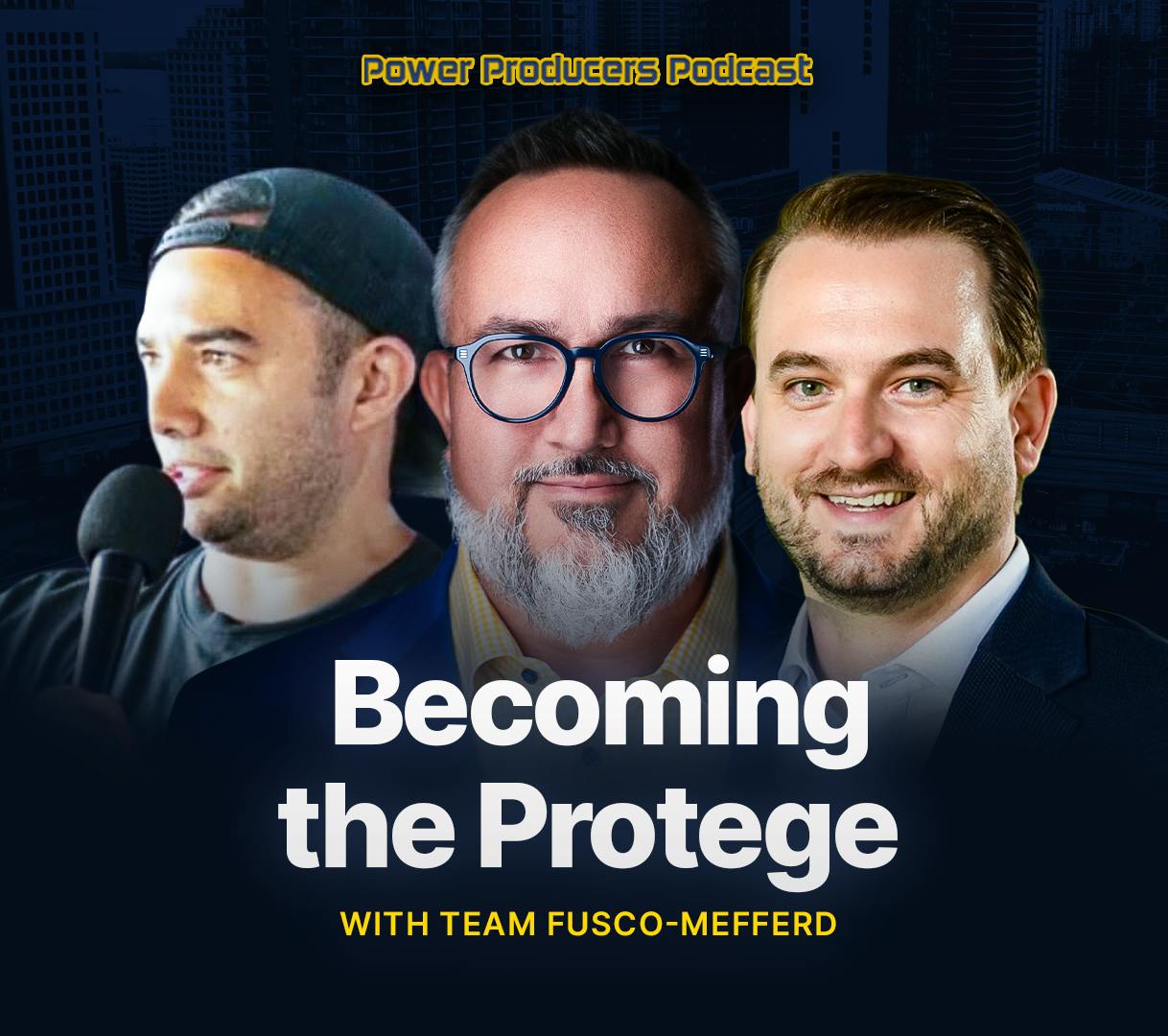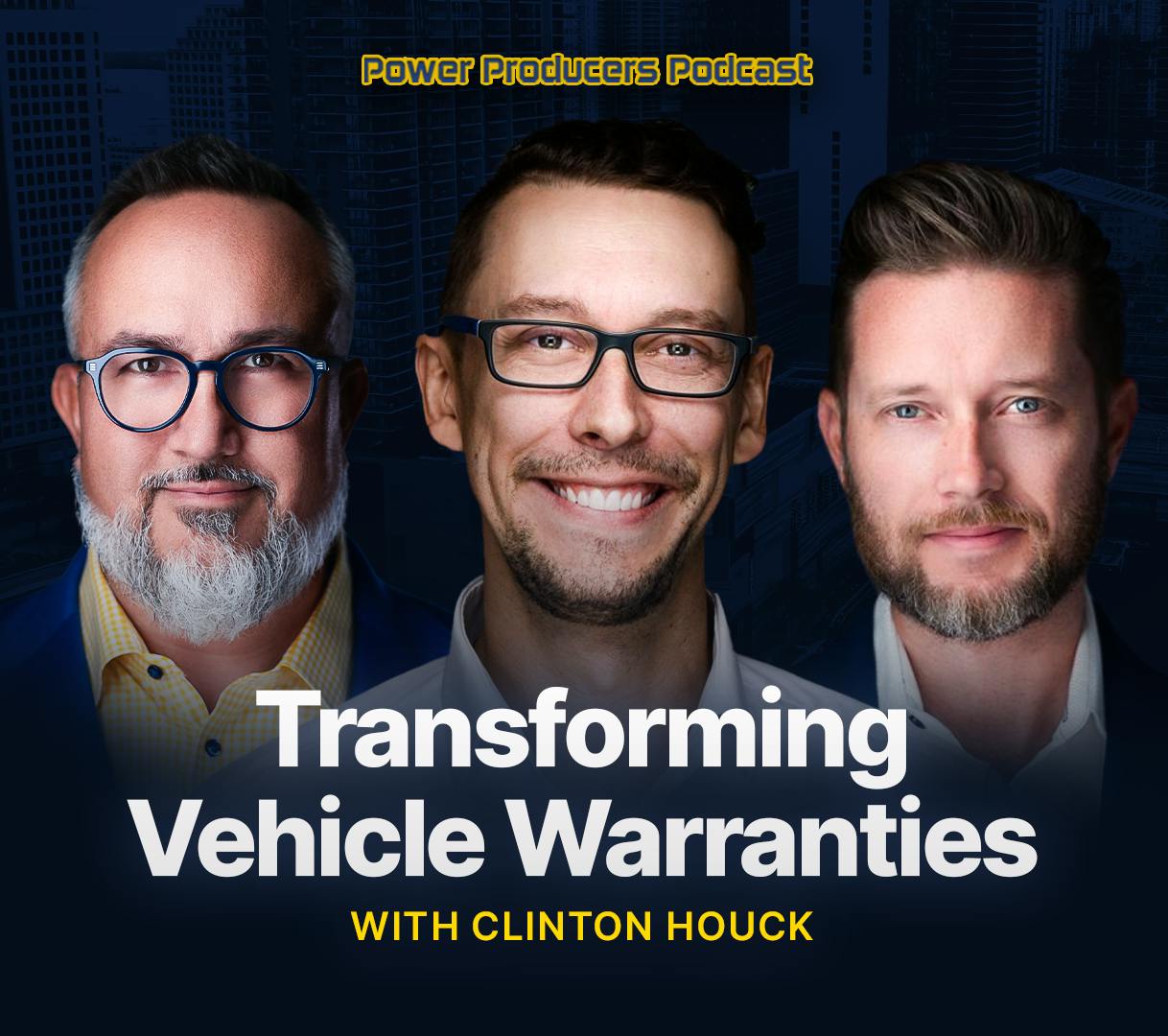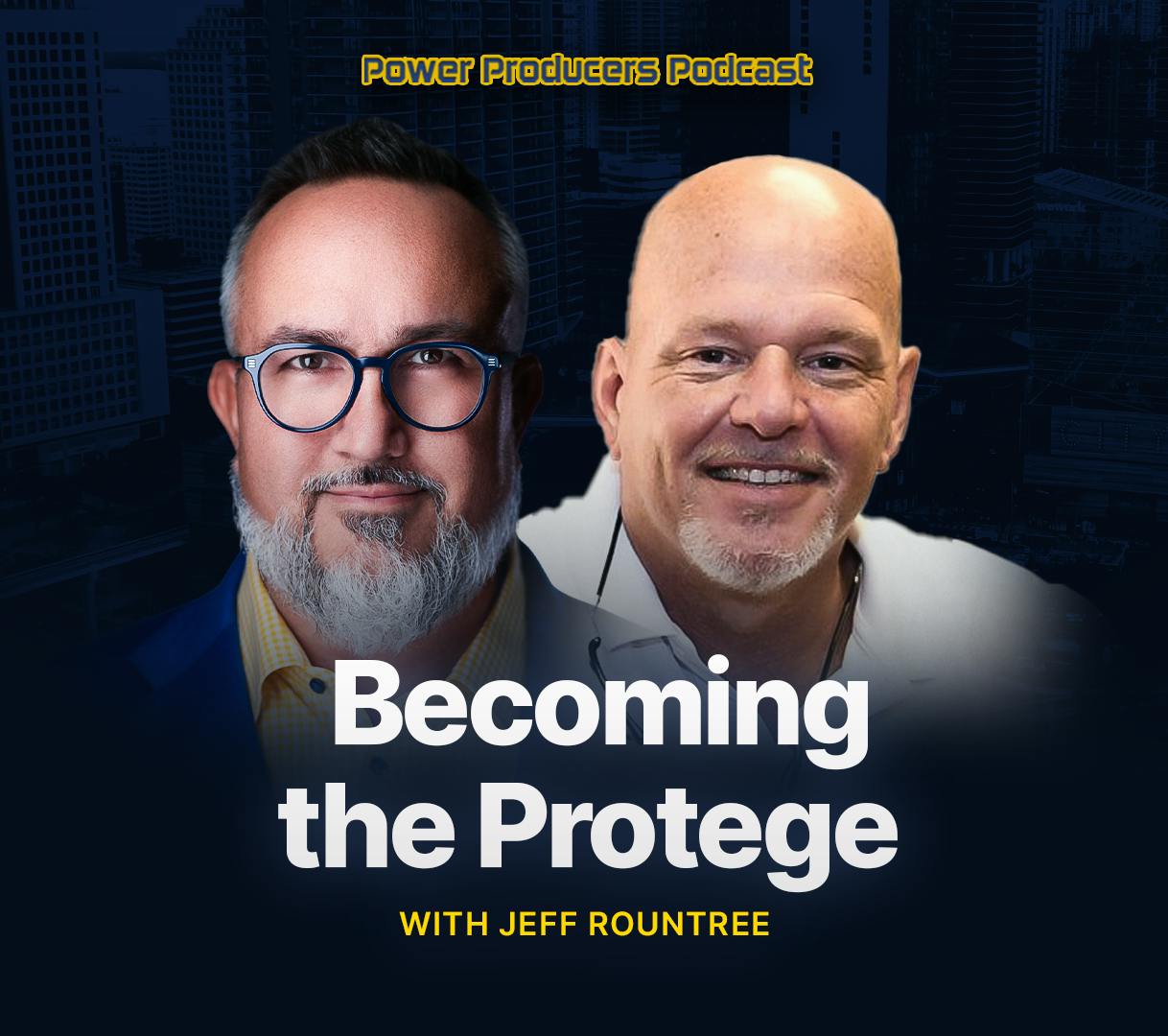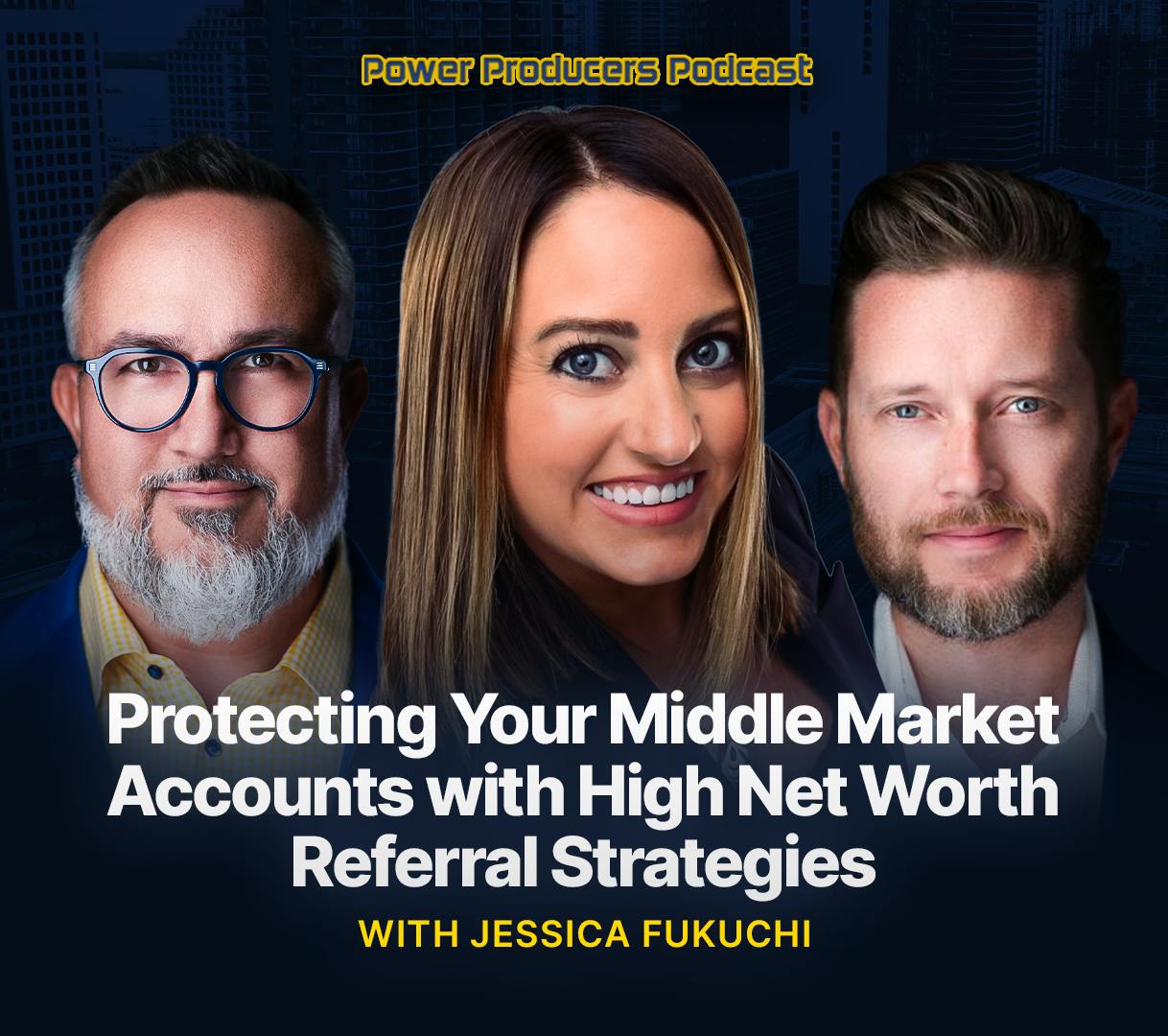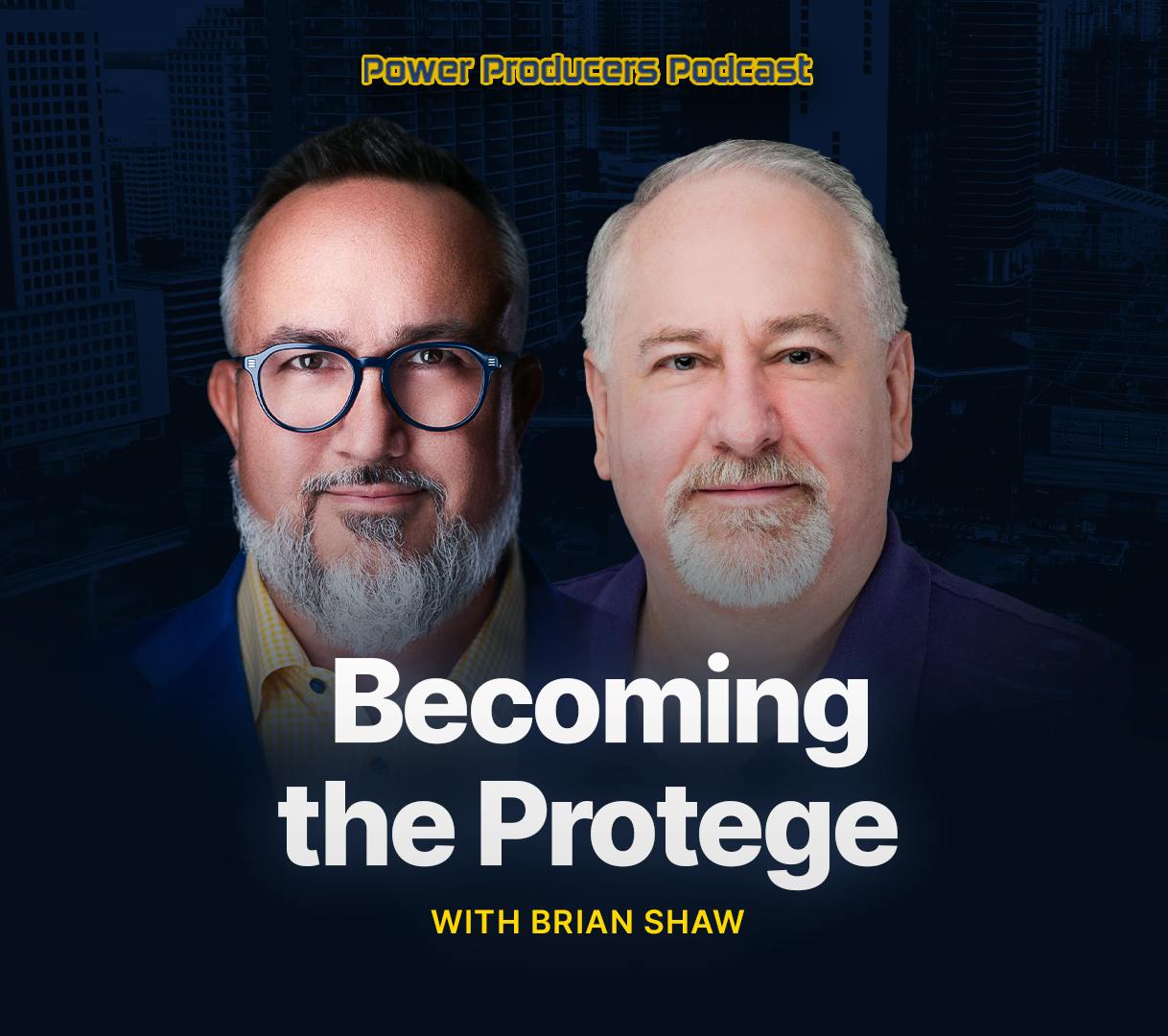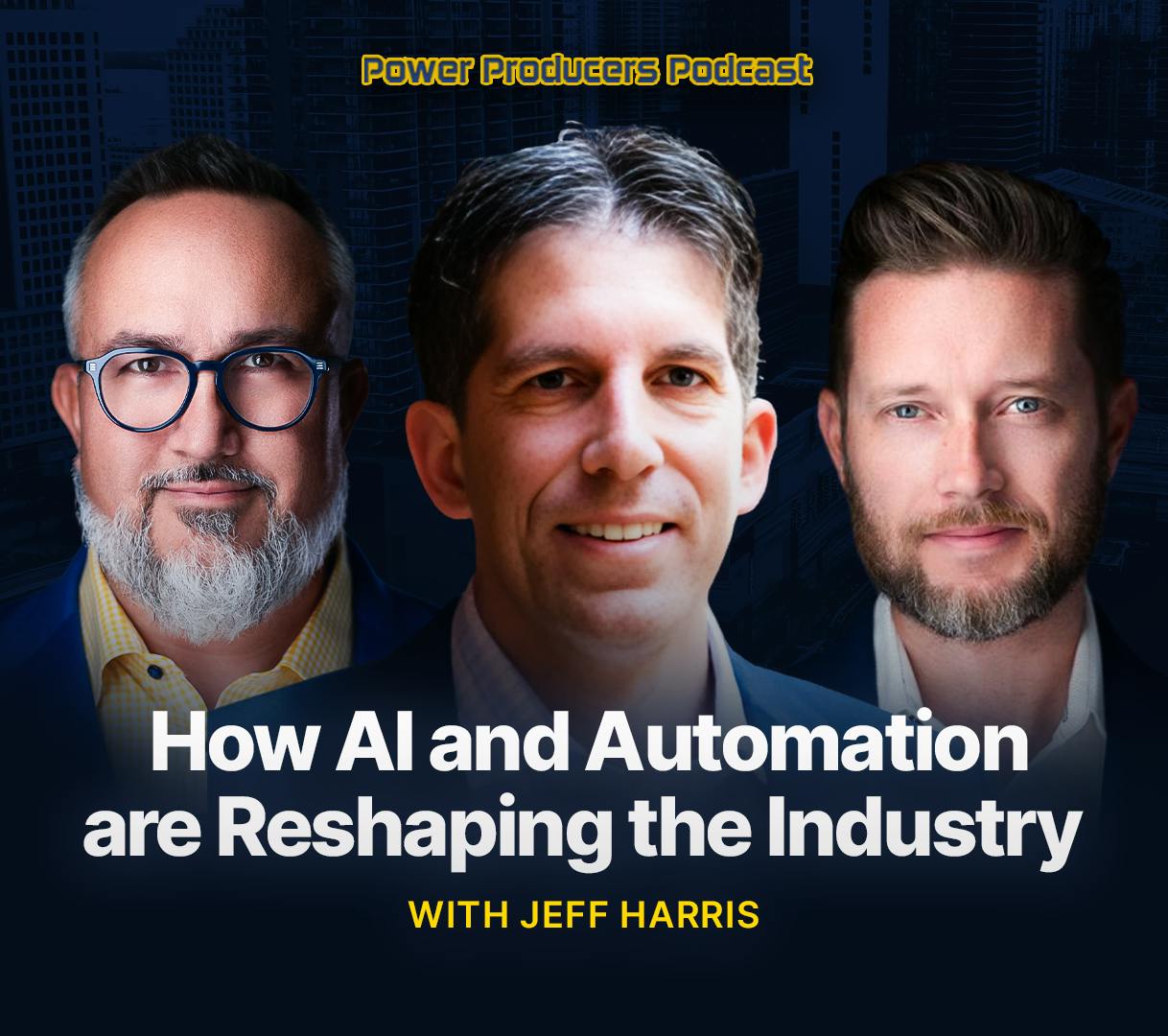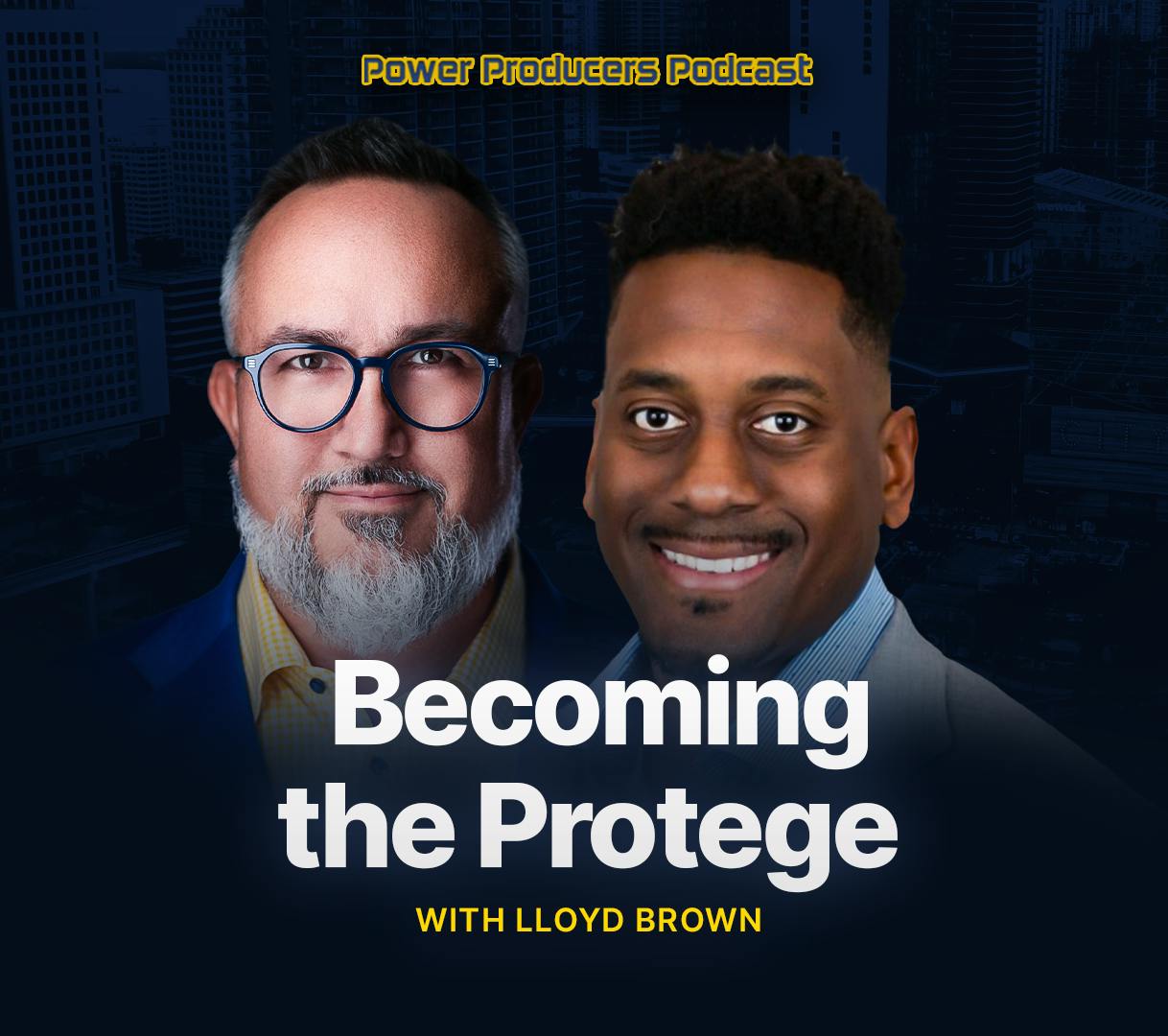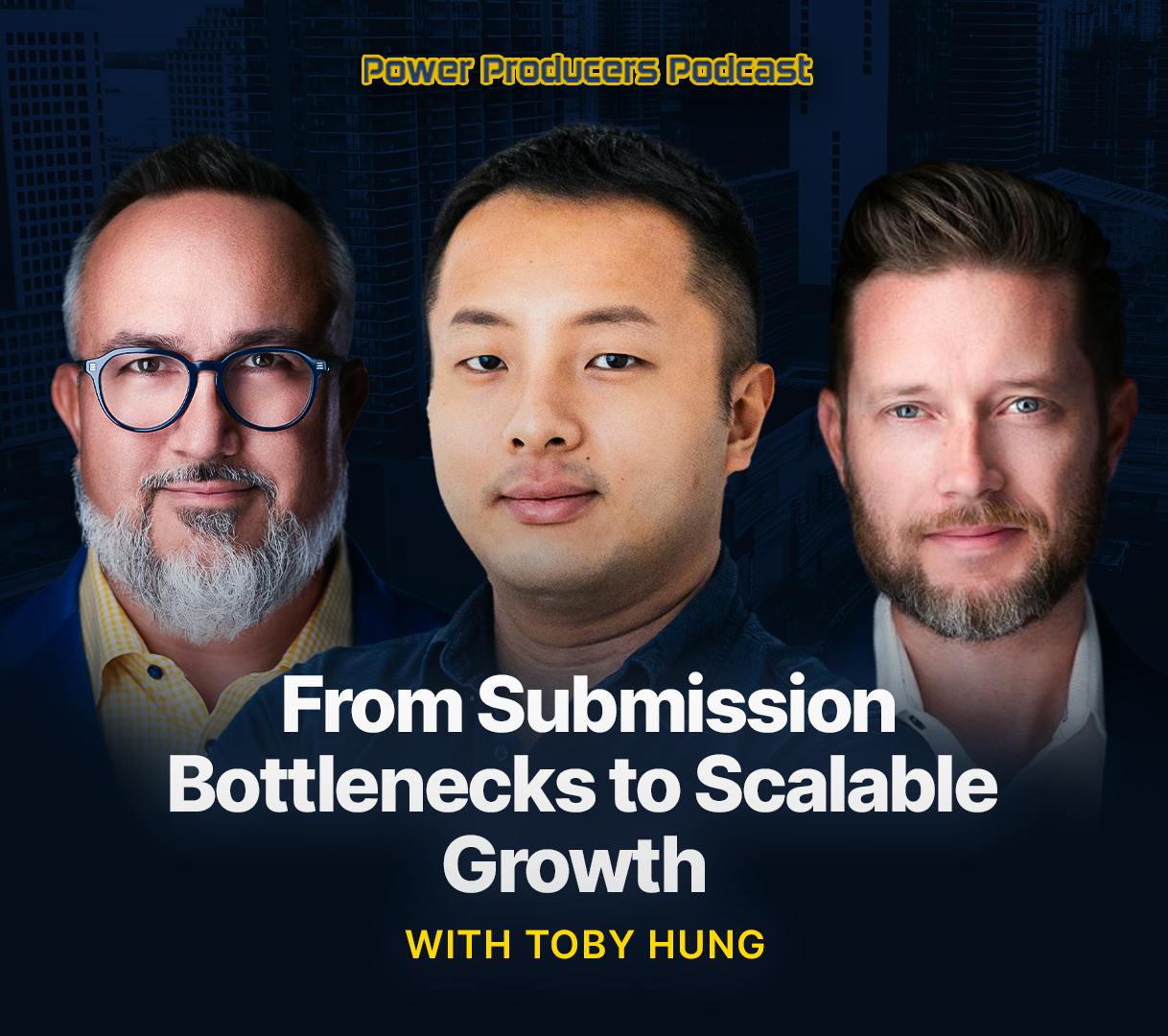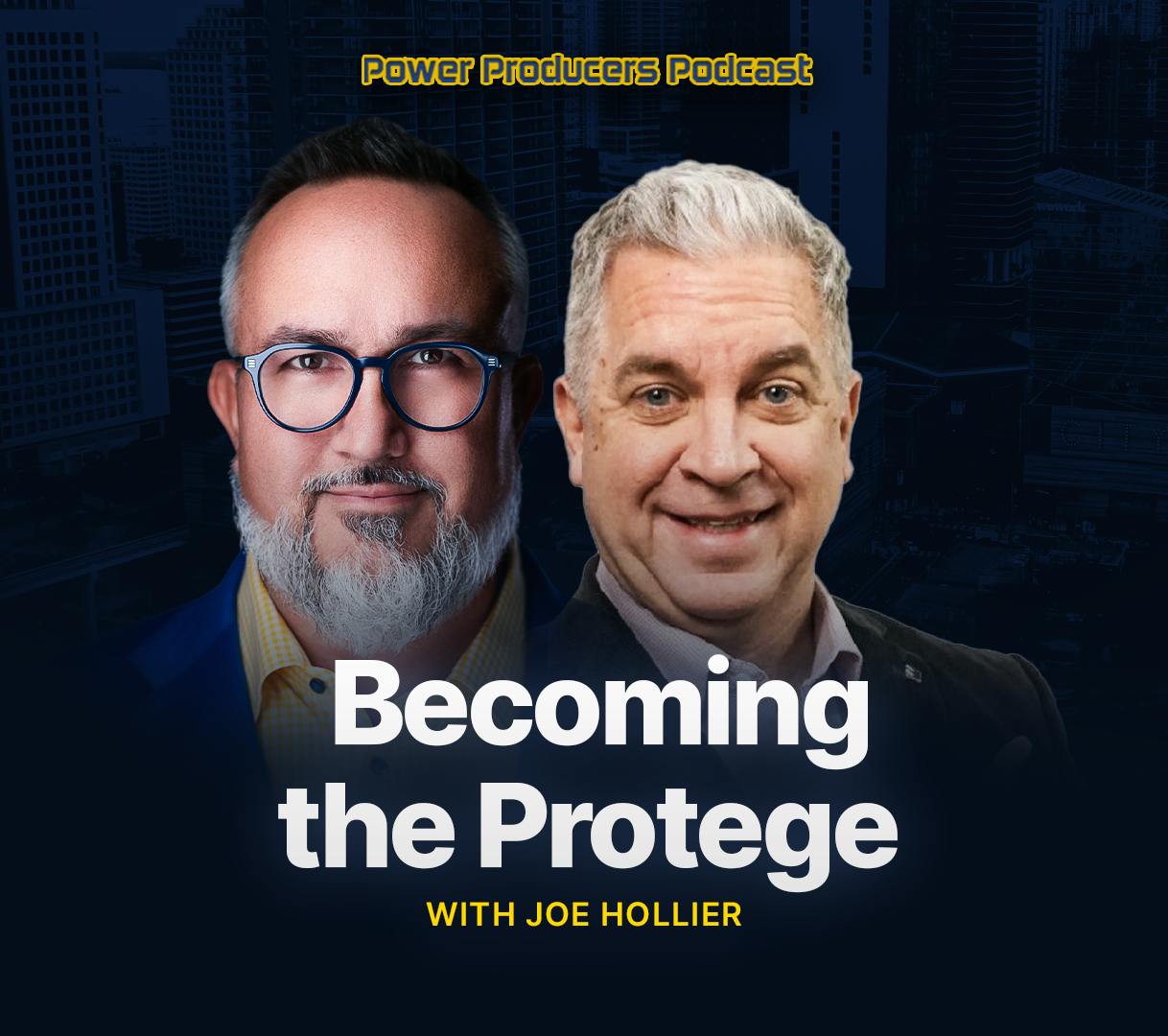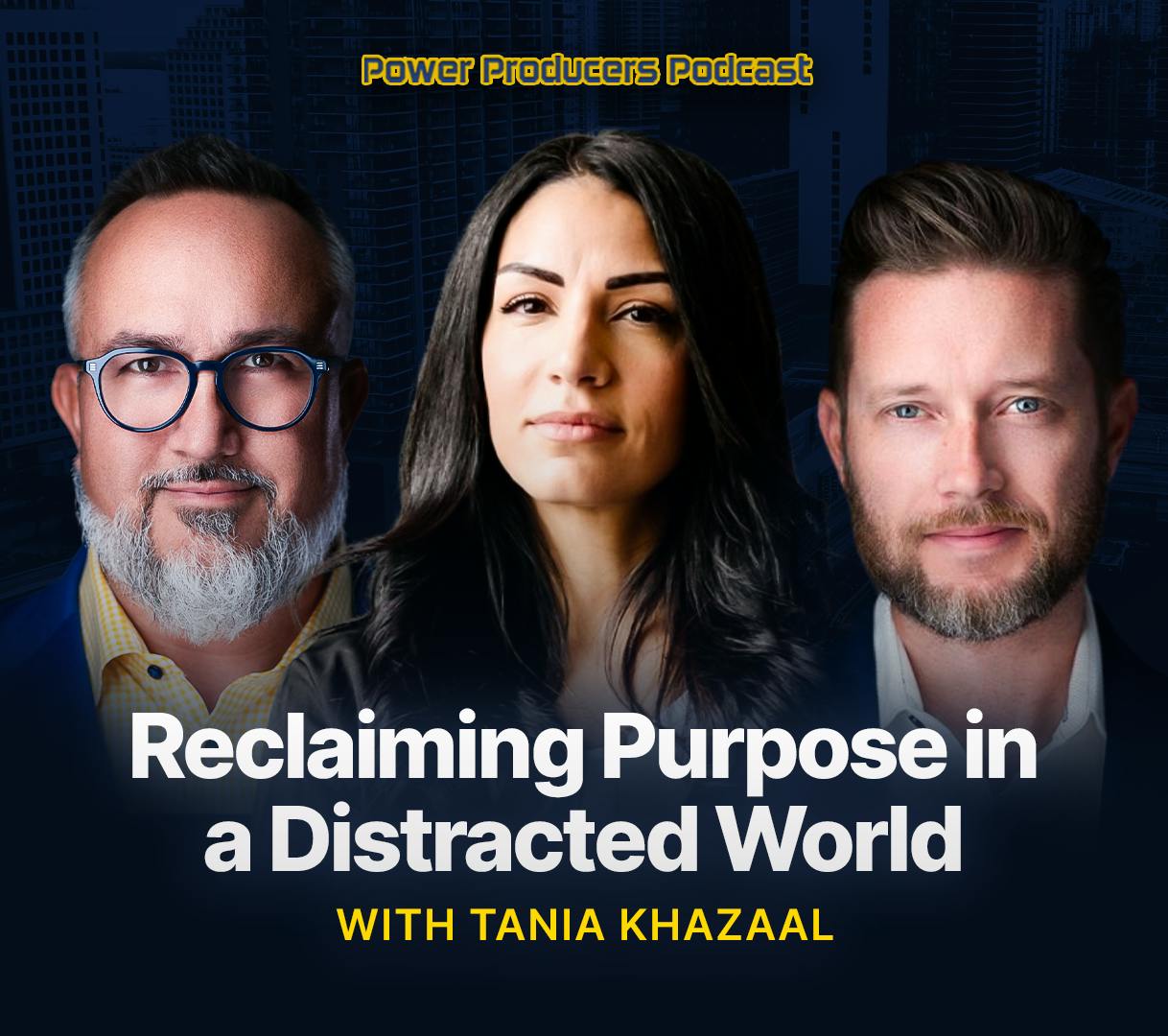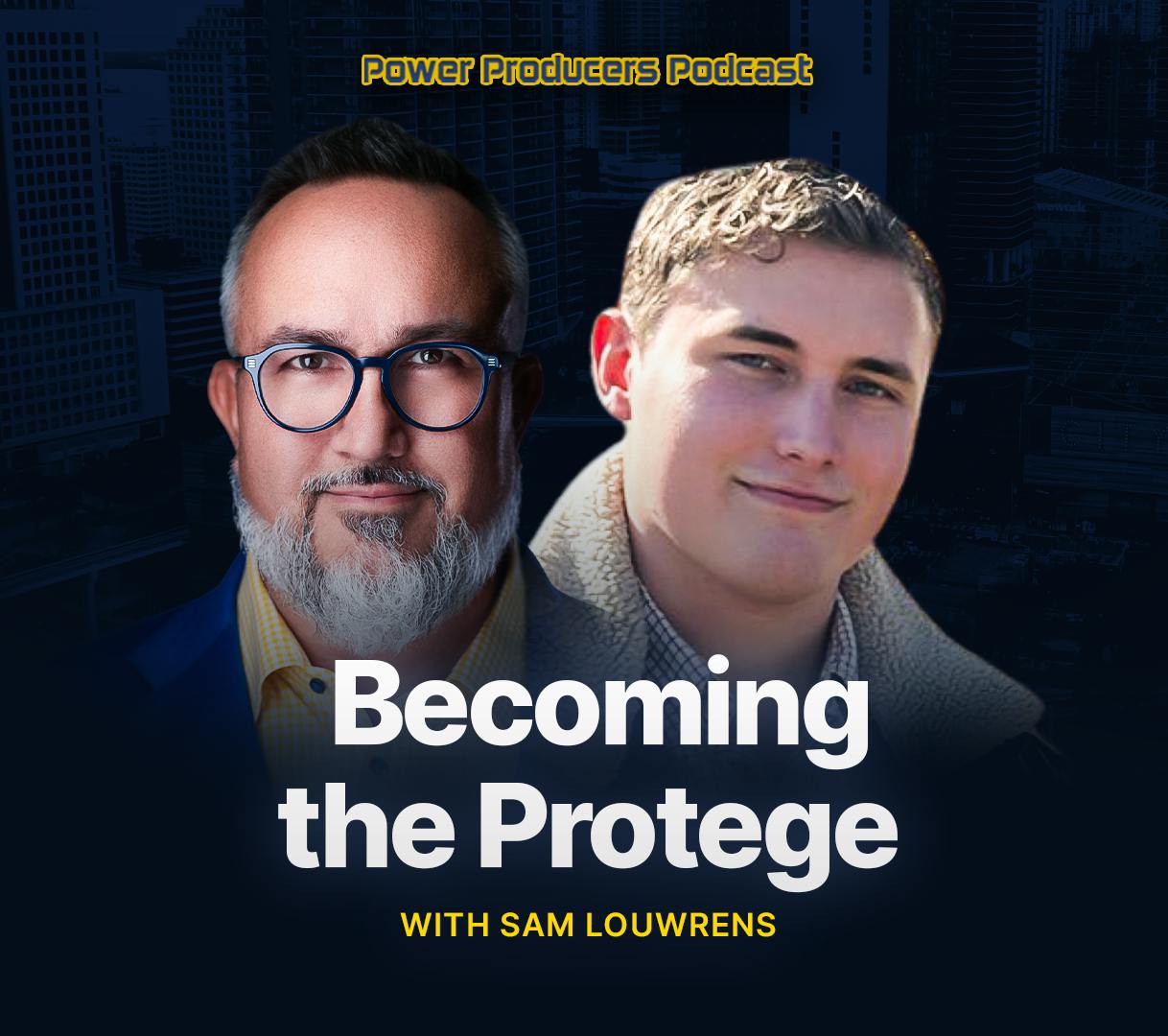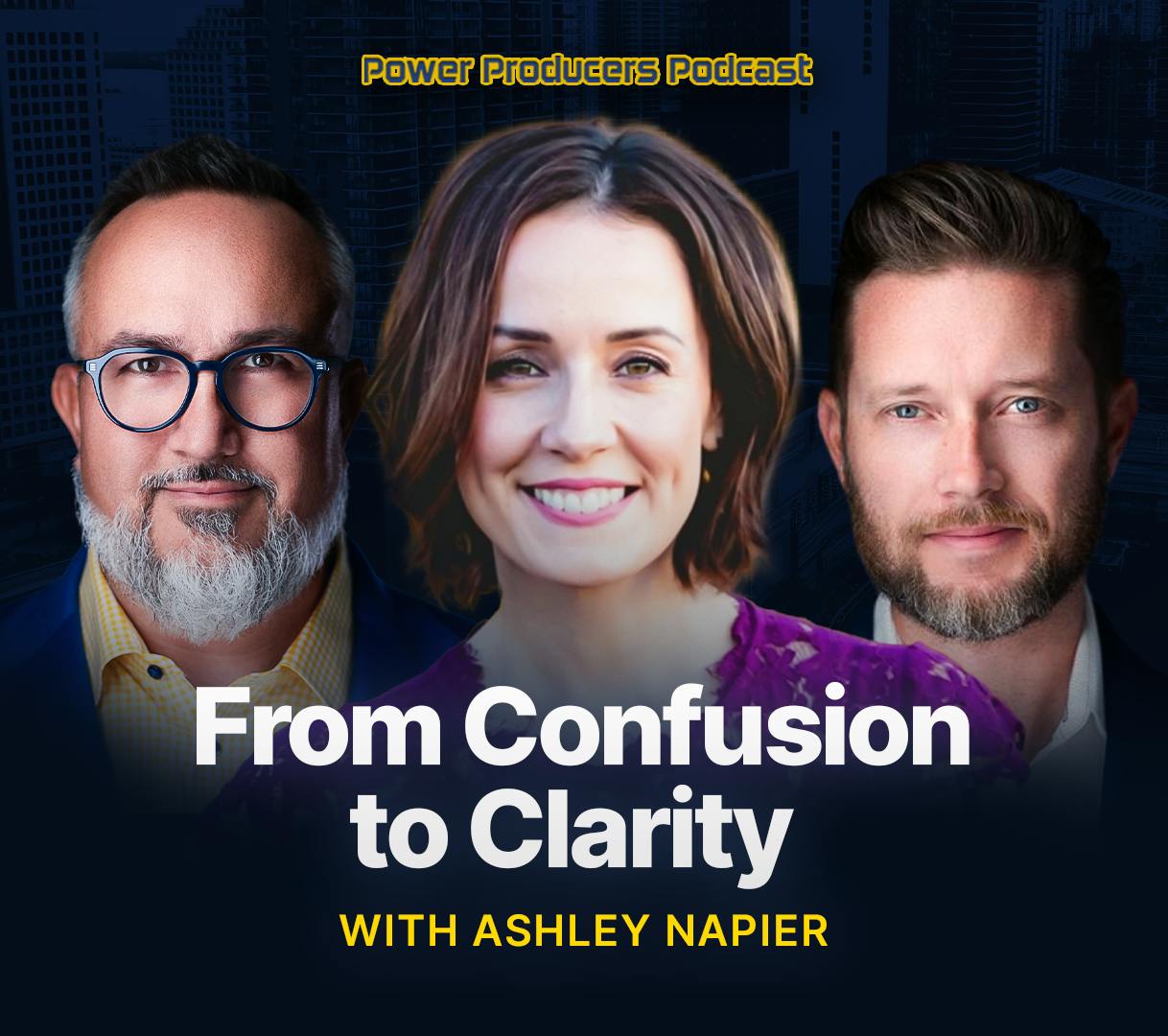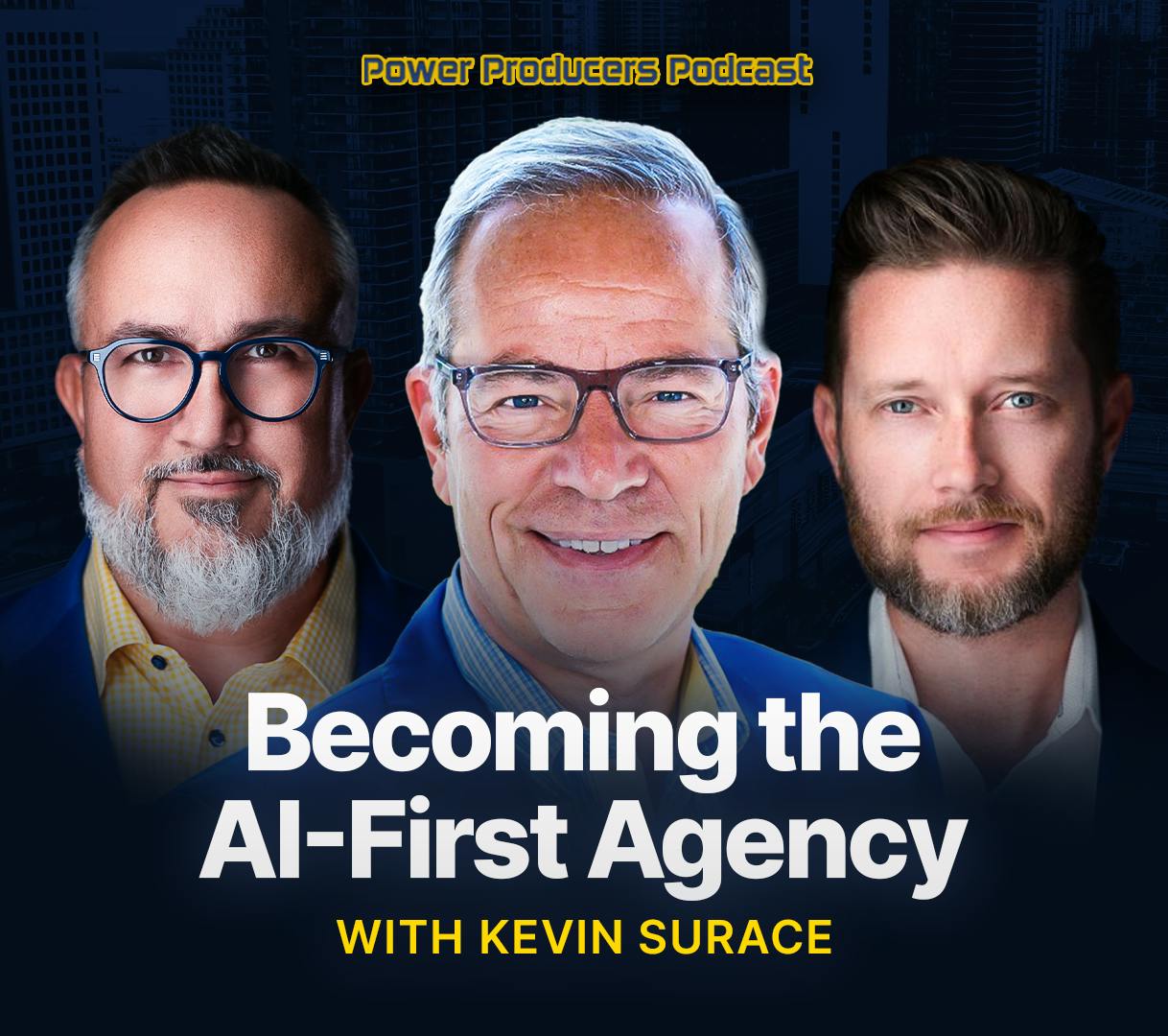Discover Power Producers Podcast
Power Producers Podcast

Power Producers Podcast
Author: David Carothers
Subscribed: 27Played: 2,970Subscribe
Share
Description
We are refining and redefining the sales game. A place where sales professionals can come to learn from other sales professionals and thought leaders who have mastered their craft. Real sales professionals. Real stories. Real results. Are you ready to feel the power?
737 Episodes
Reverse
In this episode of the Power Producers Podcast, host David Carothers sits down with Aaron Puchbauer, a contestant on Season 3 of The Protégé. Aaron’s journey to insurance is unique—he spent 15 years as a healthcare executive before a corporate restructuring led him to pivot into the world of risk management.
They discuss how Aaron’s background as a C-Suite buyer gives him a unique advantage in selling to decision-makers, why he sends meeting agendas in advance, and how he utilizes AI to prep for appointments. If you are a new producer looking to differentiate yourself, or a veteran looking to refine your process, Aaron’s "buyer-first" perspective is invaluable.
Key Highlights:
From Healthcare Executive to Insurance Producer
Aaron Puchbauer shares his transition from a 15-year career in hospital administration to becoming an independent insurance agent. He explains how the desire to control his own destiny and provide stability for his family (specifically his son with autism) drove him to an industry where effort equals equity.
The Buyer’s Perspective: Winning the Meeting
Having spent years on the other side of the table fielding pitches from vendors, Aaron knows exactly what decision-makers hate—and what they respect. He details his strategy of sending a proposed agenda well in advance of the meeting, asking the prospect to strike or add items. This simple step establishes respect for the prospect's time and differentiates him from the "show up and throw up" competition.
Boots on the Ground: Physical Risk Assessment
Aaron and David discuss the necessity of "walking the walk" during a prospect visit. Aaron shares a recent experience inspecting a restaurant where he checked everything from the walk-in coolers to the Ansel system (fire suppression). By physically inspecting the risk, he identified misclassifications and coverage gaps that the incumbent agent missed entirely.
Leveraging AI for Sales Preparation
Aaron reveals how he uses ChatGPT to prepare for sales calls. By prompting the AI to act as the business owner (e.g., a restaurant owner) and asking it to generate likely objections and questions, he walks into meetings prepared for the specific operational concerns of that industry.
The Power of "Walking Away"
David emphasizes a lesson that usually takes new producers years to learn: the ability to spot a "fool's errand." They discuss a specific case where a prospect’s data was so disjointed (impossible liquor sales vs. gross receipts) that it required a hard conversation about whether the account was even insurable, highlighting the importance of underwriting on the front end.
Connect with:
David Carothers LinkedIn
Aaron Puchbauer LinkedIn
Kyle Houck LinkedIn
Visit Websites:
Power Producer Base Camp
Imming Insurance Agency
Killing Commercial
Crushing Content
Power Producers Podcast
Policytee
The Dirty 130
The Extra 2 Minutes
In this episode of the Power Producers Podcast, host David Carothers welcomes back Andy Mathisen, Insurance Sales Manager for Homebot. They dive into how agencies can dominate the personal lines market by shifting from transactional relationships to value-driven engagement.
Andy breaks down how Homebot serves as a "set it and forget it" tool that keeps agents front-and-center with insureds while simultaneously generating leads for loan officers and realtors—flipping the traditional referral food chain on its head.
Key Highlights:
What is Homebot?
Andy explains that Homebot is a monthly home digest sent to insureds with a staggering 76% open rate. Unlike standard newsletters, this digest provides homeowners with real-time data on their home value, loan balance, and purchasing power (equity for refinances, HELOCs, or new purchases).
The "Santa Claus" Effect: Gaining Leverage
Historically, insurance agents are at the bottom of the referral food chain (Realtor > Lender > Agent). Andy details how Homebot changes this dynamic by aggregating a "Team of Professionals" on the client's dashboard. When a homeowner interacts with financial tools on the platform, the insurance agent can pass those leads back to lenders and realtors, creating immense leverage and reciprocity.
Content Strategy: Donuts vs. Data
David and Andy discuss why dropping off donuts at a loan officer's office no longer works. To win in today's market, agents must provide actionable data and tools that help their referral partners grow.
The "Too Busy" Trap
The duo critiques the mindset of agency owners who claim they are "too busy" for new leads. They discuss the necessity of implementing systems, departmentalization, and proper website content strategies (blogs vs. paid ads) to scale consulting capabilities without drowning in work.
Pet Peeves: Pick Up the Phone!
Andy shares his frustration with agencies that rely on complex phone trees or refuse to answer calls, and the growing trend of prospects "ghosting" after good sales calls.
Connect with:
David Carothers LinkedIn
Andy Mathisen LinkedIn
Kyle Houck LinkedIn
Visit Websites:
Power Producer Base Camp
Homebot Ai
Killing Commercial
Crushing Content
Power Producers Podcast
Policytee
The Dirty 130
The Extra 2 Minutes
In this episode of Power Producer Shop Talk, host David Carothers interviews Pam Seidler, the only female contestant in Season 3 of The Protégé. Pam shares her diverse background, from working in radio and TV to oxygen sales and a stint in the captive insurance world with AAA. Now, she's diving headfirst into commercial insurance, eager to prove that being new to the industry is not a disadvantage but an opportunity to learn without bad habits.
David and Pam discuss the importance of mentorship, finding the right agency culture, and why starting directly in the middle market can be more beneficial than cutting teeth on small commercial accounts. Pam also opens up about her niche focus on the pet industry and gathering places (coffee shops, etc.), leveraging her past experiences to build a unique book of business.
Key Highlights:
Breaking into the Industry
Pam shares her winding career path, which included stops at Fox News, tech startups, and medical sales, before a chance encounter on a plane planted the seed for an insurance career. After gaining experience as a captive agent, she made the leap to the independent side, drawn by the freedom and limitless potential of commercial insurance.
The "New Producer" Advantage
David argues that hiring producers with zero insurance experience is often better than hiring veterans with bad habits. Pam embodies this "blank slate" advantage, approaching the competition with a hunger to learn and no preconceived notions about how things should be done. This mindset allows her to absorb coaching and implement new strategies rapidly.
Niche Focus: Pets & Gathering Places
Drawing on her early career aspirations with Petco and PetSmart, Pam discusses her strategy to target the pet industry—from groomers to boarding facilities—as a primary niche. She also plans to focus on "gathering places" like coffee shops, utilizing her natural ability as a connector to build relationships in these community hubs.
Finding the Right Agency Culture
David advises Pam (and listeners) on how to interview an agency. He suggests bold moves like asking to speak with top and bottom producers, as well as current and former clients, to get a true picture of the agency's deliverables and support structure. This transparency is key to finding a long-term home.
The Power of Spousal Support
David shares a personal story about how his wife's unwavering support was the catalyst for launching Florida Risk Partners. He emphasizes that a strong support system at home is crucial for any producer navigating the ups and downs of a sales career, a philosophy he integrates into his Producers in Paradise event.
Connect with:
David Carothers LinkedIn
Pam Siedler LinkedIn
Kyle Houck LinkedIn
Visit Websites:
Power Producer Base Camp
AHI Insurance Group
Killing Commercial
Crushing Content
Power Producers Podcast
Policytee
The Dirty 130
The Extra 2 Minutes
In this episode of the Power Producers Podcast, host David Carothers interviews Dean Bowen of Patriotic Insurance. Dean represents the next generation of producers, having transitioned from a background in blue-collar labor (roofing, manufacturing) into the insurance industry just over a year ago.
They discuss the mental shift required to move from task-based physical labor to the self-motivated world of sales, the pros and cons of "niching down" too early, and Dean's fascinating deep dive into insuring Cryptocurrency Mining and High-Performance Computing (HPC) operations.
Key Highlights:
From Blue Collar to White Collar
Dean shares his journey from patching roofs to writing policies. He explains that the hardest transition wasn't learning the coverage, but shifting his mindset from tangible, task-based work ("move that pile") to the ambiguous, self-directed metrics of insurance sales. However, his background allows him to instantly understand what his contractor clients value most.
The Trap of Niching Too Fast
While specialization is often encouraged, Dean admits he tried to brand himself as a specialist too early in his career. He discusses how this inadvertently discredited him with some prospects for general commercial real estate and why he recommends a more organic approach to finding your niche.
Insuring the Wild West: Crypto & HPC
Dean breaks down the complex world of insuring Bitcoin mining and High-Performance Computing. He details the three main types of clients (Co-host providers, Self-hosted miners, and Hosted miners) and the specific underwriting challenges they face, such as fluctuating currency values making Business Income coverage nearly impossible to place.
Family Business Boundaries
Working with family can be tough, but Dean and his father (the agency principal) have a system. Dean shares his simple but effective rule for maintaining a healthy relationship: Business is conducted on Microsoft Teams, personal life happens via Text.
Advice for New Producers
Dean advises new agents to cut their teeth on Commercial Real Estate. It offers a crash course in building valuation, occupancy codes, and risk assessment that serves as a foundation for more complex risks later on.
Connect with:
David Carothers LinkedIn
Dean Bowen LinkedIn
Kyle Houck LinkedIn
Visit Websites:
Power Producer Base Camp
Patriotic Insurance Group
Killing Commercial
Crushing Content
Power Producers Podcast
Policytee
The Dirty 130
The Extra 2 Minutes
In the seventh installment of the "Becoming the Protégé" series on Power Producers Shoptalk, host David Carothers interviews the first set of coaches for The Protégé Season 3: Zach Mefferd, Founder and CEO of ZipBonds, and Mike Fusco, President of Fusco & Orsini Insurance Services. Dressed in costumes (including sunglasses), the trio discusses their coaching strategies, evaluates the current crop of contestants, and strategizes for the upcoming draft. They also dive into the massive opportunity created by industry consolidation, sharing how independent agents can capitalize on the service gaps left when large brokerages acquire local agencies.
Key Highlights:
Coaching Strategies for The Protégé Season 3 Draft
Zach Mefferd and Mike Fusco join David to discuss their approach to coaching Season 3. While they keep their specific draft picks close to the vest, they hint at targeting contestants like Sam, Joe, and Jacob, noting Lloyd as a potential "dark horse." They emphasize that their coaching will focus on building both strengths and weaknesses, treating the competition like a sport to maximize producer performance.
Why Insurance Mentorship is Critical for Producer Success
The group agrees that the real prize of The Protégé isn't just winning, but the "priceless" access to insurance mentorship and industry connections. David highlights the weekly guest mentor calls featuring top industry leaders as an invaluable resource that participants should leverage fully to accelerate their careers, regardless of whether they make it to the end of the competition.
Leveraging Insurance Industry Consolidation to Win New Business
Mike and David discuss the significant opportunity created by rapid M&A activity and insurance industry consolidation. They note that when large brokerages acquire local agencies, service often suffers ("blood in the water"), creating a prime opening for independent agents to prospect dissatisfied clients who feel neglected by the new ownership.
The Strategic Advantage of the Independent Insurance Agency
The coaches proudly identify as "minorities" in the industry—independent agency owners who haven't sold out to private equity. They discuss the strategic advantage of remaining independent and local, especially when competing against national firms that often struggle to maintain the personalized service and community ties that made the acquired agencies successful in the first place.
Season 3 Roadmap: Timeline and Contestant Development
David outlines the timeline for the season, mentioning the upcoming live draft and the start of challenges, likely ramping up after the holidays to respect everyone's family time. He reiterates his commitment to providing candid feedback to help insurance producers grow, treating them like members of his own team.
Connect with:
David Carothers LinkedIn
Mike Fusco LinkedIn
Zach Mefferd LinkedIn
Kyle Houck LinkedIn
Visit Websites:
Power Producer Base Camp
Fusco Orsini & Associates Insurance Services
ZipBonds
Killing Commercial
Crushing Content
Power Producers Podcast
Policytee
The Dirty 130
The Extra 2 Minutes
In this episode of the Power Producers Podcast, host David Carothers sits down with Elana Burr, Co-Founder and President of Talent Harbor. They tackle one of the insurance industry's biggest headaches: acquiring top-tier sales talent. David shares his own frustrating journey of trying to enter the industry without a "traditional" background, while Elana pulls back the curtain on how recruiters identify the "intangibles" that resumes often miss.
If you are an agency owner tired of the revolving door of producers, or a candidate looking to break into the industry, this conversation provides the blueprint for finding the right fit.
Key Highlights:
Beyond the Resume:
Elana and David discuss why industry experience is often overrated. The best hires frequently come from outside the industry, possessing innate traits like drive, competitiveness, and grit rather than just a list of insurance certifications.
The "Good Conversation" Trap:
Salespeople are professional communicators. Elana explains the danger of hiring someone simply because they "sold" you during the interview and how to use behavioral questioning to verify actual performance metrics versus a good story.
The Passive Candidate Strategy:
Why relying on job boards is a losing game. Elana reveals that 90% of their strategy involves hunting "passive candidates"—A-players who are currently winning in their roles and aren't looking for a job until they are approached.
The Sales Manager Paradox:
A common (and fatal) mistake agencies make is promoting their top producer to sales manager. The skill sets are often diametrically opposed, leading to a loss of revenue and a frustrated employee.
Social Media as a Double-Edged Sword:
Employers are looking at your profiles. The duo discusses how social media can be a massive asset for building a personal brand, or a liability that disqualifies a candidate immediately.
Connect with:
David Carothers LinkedIn
Elana Burr LinkedIn
Kyle Houck LinkedIn
Visit Websites:
Power Producer Base Camp
Talent Harbor
Killing Commercial
Crushing Content
Power Producers Podcast
Policytee
The Dirty 130
The Extra 2 Minutes
In the sixth installment of the "Becoming the Protégé" series on Power Producers Shop Talk, host David Carothers speaks with contestant Jacob Brawner of Brawner Insurance, based in Iowa and serving the Midwest. Jacob shares his unconventional path from being a teacher to joining his family's agency, originally focused on crop insurance. The conversation highlights Jacob's educational background as a key asset in his sales process, allowing him to patiently teach clients rather than just sell to them. They also discuss the importance of detaching from the outcome, the value of building a consistent pipeline, and how Jacob plans to leverage the mentorship and networking opportunities within The Protégé to accelerate his agency's growth.
Key Highlights:
From the Classroom to Commercial Insurance
Jacob Brawner explains his transition from teaching to insurance, driven by a desire to continue his father's legacy after his brother purchased the agency. He discusses the steep learning curve of moving from a specialized crop insurance focus to a broader commercial portfolio and how his teaching background gives him a unique advantage in educating clients.
Sales as an Educational Process
David and Jacob dive into the philosophy that sales is actually education. They agree that taking the time to explain the "why" behind coverages, renewal processes, and loss runs builds trust and leads clients to ask the right questions, ultimately making the sale a natural conclusion rather than a high-pressure pitch.
Detaching from the Outcome & Pipeline Strategy
The conversation emphasizes the power of detaching from the outcome. David shares his mindset that he enters every meeting already in the "worst-case scenario" (not having the account), so there is only upside. They discuss the critical need for a robust pipeline to remove the desperation from sales, allowing producers to walk away from bad fits and focus on long-term relationships.
The Power of Mentorship and Networking
Jacob expresses his excitement for the mentorship aspect of The Protégé, noting that the Friday mentor calls alone are "priceless." He shares how the competition has already accelerated his growth and connected him with industry leaders, reinforcing David's point that the real victory lies in the process and the network built, not just the final prize.
Identifying the Competition in Protege
When asked who he sees as his stiffest competition, Jacob points to Aaron from the Carlyle Agency, citing their reputation as a "big deal" in the region. David offers his own take, noting that while Jacob, Joe, and Sam had the top video submissions, past seasons have shown that grit and execution often outweigh production value.
Connect with:
David Carothers LinkedIn
Jacob Brawner LinkedIn
Kyle Houck LinkedIn
Visit Websites:
Power Producer Base Camp
Brawner Insurance
Killing Commercial
Crushing Content
Power Producers Podcast
Policytee
The Dirty 130
The Extra 2 Minutes
In this episode of the Power Producers Podcast, David Carothers, Kyle Houck, and Clinton Houck explore how technology, customer experience, and new product offerings are reshaping opportunities in the insurance industry.
Clinton, who started his career at State Farm and later moved into the insurtech space, shares how his path led him to Fair, a company reimagining the vehicle warranty space. Historically plagued by poor customer experiences and shady telemarketing tactics, warranties are being reinvented as a trustworthy, transparent, and agency-distributed product.
Key Highlights:
Disrupting Auto Warranties
Clinton Houk explains how Fair eliminates dealership markups and regulation issues to offer independent agents a transparent, partner-focused warranty solution with a superior claims experience.
The "Plus One" Cross-Sell
Learn how to seamlessly integrate warranty discussions into everyday workflows. This strategy offers clients critical financial protection against repair bills while boosting agency revenue and retention.
Closing Commercial Coverage Gaps
David and Clinton highlight a major opportunity: protecting rideshare drivers and commercial fleets, which are often excluded by standard personal warranties, from cash flow shocks.
Plug-and-Play Sales Tech
Clinton details Fair’s agent-friendly technology, from embeddable quoting links and APIs to an in-house sales team that can handle the entire process for your agency.
Connect with:
David Carothers LinkedIn
Clinton Houck LinkedIn
Kyle Houck LinkedIn
Visit Websites:
Power Producer Base Camp
Fair
Killing Commercial
Crushing Content
Power Producers Podcast
Policytee
The Dirty 130
The Extra 2 Minutes
In this fifth installment of the "Becoming the Protégé" series on Power Producers Shop Talk, host David Carothers chats with contestant Jeff Rountree, principal of the Roundtree Agency. The conversation is a flavorful blend of business strategy and culinary passion, as Jeff shares his journey from life insurance and corporate training to commercial ownership. They dive into the challenges of navigating an agency after a partner's passing, the importance of specialization in niche markets like health and fitness, restaurants, and contractors, and how Jeff's participation in The Protégé is already reshaping his professional life through networking and mentorship.
Key Highlights:
From Corporate Training to Agency Principal
Jeff Rountree shares his pivot from life insurance to commercial ownership, navigating a partner's passing to focus on niche specialization in markets like restaurants and contractors.
The Protégé: More Than a Competition
Jeff joins Season 3 not just to win, but to leverage top-tier mentorship, expand his network, and accelerate his agency's growth through continuous learning.
Mastering the Technical Side
Jeff emphasizes the need for "brain surgeon" precision in insurance auditing and classifications to differentiate himself from transaction-focused agents.
Crafting the Underwriter Narrative
To prevent non-renewals, Jeff advocates for onsite client visits to build detailed, compelling stories for underwriters rather than simply submitting forms.
Business Acumen with a Culinary Twist
Using stories of cooking Katz's Deli pastrami and Italian pasta, Jeff illustrates how patience, preparation, and attention to detail are the secret ingredients for sales success.
Connect with:
David Carothers LinkedIn
Jeff Rountree LinkedIn
Kyle Houck LinkedIn
Visit Websites:
Power Producer Base Camp
Roundtree Agency
Killing Commercial
Crushing Content
Power Producers Podcast
Policytee
The Dirty 130
The Extra 2 Minutes
In this episode of the Power Producers Podcast, host David Carothers and co-host Kyle Houck welcome back Brian Ahearn, Chief Influence Officer at Influence PEOPLE. They discuss his fifth book, Influence from Above, a business parable that merges Robert Cialdini’s principles of persuasion with Biblical tenets. The conversation explores modern authorship using AI, the strict definition of ethical influence, and how to maintain relationships in a polarized world.
Key Highlights:
The Genesis of "Influence from Above"
Brian Ahearn shares how a conversation with his daughter inspired him to map influence principles to Biblical concepts. The book serves as a sequel to The Influencer, following the main character as he applies these strategies within a church setting.
Accelerating the Writing Process with AI
David and Brian discuss leveraging technology in authorship. Brian details how he used ChatGPT as a real-time developmental editor—not to write the content, but to ensure character consistency and speed up editing, allowing him to finish the manuscript in just two months.
Defining Ethical Influence
Brian outlines his three-part framework to ensure influence never crosses into manipulation: 1) Be truthful, 2) Use natural principles (don't manufacture scarcity), and 3) Build relationships to leave people better off.
Navigating Polarization and Relationships
The group tackles the "cutoff culture" on social media. Brian explains how applying the principle of Liking and remaining genuinely curious about differing viewpoints allows him to maintain friendships despite opposing worldviews.
Book Giveaway and Bonus Offer
David announces a giveaway for the first 12 listeners to email him. Brian adds a bonus: buy the new book, email him the title of Chapter 2, and receive a digital copy of the prequel, The Influencer, for free.
Connect with:
David Carothers LinkedIn
Brian Ahearn LinkedIn
Kyle Houck LinkedIn
Visit Websites:
Power Producer Base Camp
Influence PEOPLE, LLC
Killing Commercial
Crushing Content
Power Producers Podcast
Policytee
The Dirty 130
The Extra 2 Minutes
In this episode of the Power Producers Podcast, host David Carothers and co-host Kyle Houck are joined by Jessica Fukuchi, co-founder of PCRG Insurance. They dive into the often-overlooked world of high-net-worth personal lines insurance and why middle-market commercial producers need to pay attention to it. Jessica shares her journey from a captive agent to building an independent agency specializing in high-net-worth clients, often through referrals from financial advisors. The conversation explores the strategic importance of partnering with a high-net-worth specialist to protect commercial accounts from being poached by large brokerages that offer both commercial and private client services.
Key Highlights:
Protecting Your Book with High Net Worth Partners
David emphasizes a critical vulnerability for middle-market producers: if you aren't addressing the personal insurance needs of business owners and executives, a competitor who does—like a large national broker—can use that as a wedge to take the entire commercial account. Partnering with a specialist like Jessica allows agents to offer this service without having to master the complexities of the high-net-worth market themselves.
Navigating the High Net Worth Landscape
Jessica explains the nuances of the high-net-worth market, from working with family offices to understanding the complex portfolios of wealthy clients (multiple homes, luxury cars, etc.). She discusses the current hard market for umbrella and excess liability, noting that securing high limits often requires stacking policies from multiple carriers, a strategy far different from standard personal lines.
The "Duty to Offer" and Risk Management
The discussion touches on the agent's "duty to offer" comprehensive protection. David and Jessica agree that failing to discuss personal excess liability or cyber coverage with a wealthy client is a disservice that could lead to E&O issues. They highlight unique risks like kidnap and ransom for high-profile clients and the importance of addressing the "insurance junk drawer" many wealthy individuals accumulate.
Work-Life Balance and Setting Boundaries
Jessica shares her personal journey of overcoming burnout by setting strict boundaries between work and personal life. She discusses how delegating tasks, hiring a VP, and being transparent with her team about her need for family time allowed her to regain balance. This segment resonates with the hosts, who also prioritize life experiences and travel over being tethered to the office 24/7.
Connect with:
David Carothers LinkedIn
Jessica Fukuchi LinkedIn
Kyle Houck LinkedIn
Visit Websites:
Power Producer Base Camp
PCRG Insurance
Killing Commercial
Crushing Content
Power Producers Podcast
Policytee
The Dirty 130
The Extra 2 Minutes
In the fourth installment of the "Becoming the Protégé" series on Power Producers Shop Talk, host David Carothers welcomes contestant Brian Shaw, the Principal at Alamo Insurance Professionals. Brian, a veteran of the US Army, law enforcement, and the financial services world, shares his powerful "why" for joining the competition. He discusses his unique challenge of feeling like he's "running in quicksand" while trying to grow his two-year-old agency and simultaneously train his son, who has Asperger's and type 1 diabetes. The conversation is a candid look at the father-son dynamic, the need for proven systems, and finding the discipline to succeed.
Key Highlights:
A Veteran's "Why": Building a Legacy
Brian Shaw explains that after 20 years in the industry and a near-fatal battle with COVID that cost him his medical device business, he returned to commercial insurance. He joined The Protégé to find the systems and discipline he needs to train his son effectively, break his own "bad habits," and build a lasting legacy for his family.
The Father-Son Dynamic & Overcoming Challenges
Brian opens up about the unique joys and frustrations of working with his 31-year-old son, who is on the autism spectrum. He shares his personal struggles as a father and trainer, noting that his son is a "sponge" for information but struggles with focus and the father-son dynamic. Brian's goal is to use The Protégé's framework to become a better teacher and provide a clear path for his son to follow.
Niche Focus: Construction and Agriculture
With a deep personal background in agriculture (growing up on a farm in Indiana, 4-H, and FFA) and a strategic focus on construction (HVAC, electrical, and plumbing), Brian is working to establish his agency as a true risk management partner, not just a "policy peddler," in these specific niches.
Fear of Failure: "I'm Most Concerned About Myself"
When asked who he's most worried about in the competition, Brian gives the honest answer: himself. He shares his fear of letting his family and son down and his self-identified shortcoming of "tweaking" systems that are working instead of just executing. David's tip is to focus on the process—which is the real victory—rather than the competition.
Connect with:
David Carothers LinkedIn
Brian Shaw LinkedIn
Kyle Houck LinkedIn
Visit Websites:
Power Producer Base Camp
Alamo Insurance Professionals
Killing Commercial
Crushing Content
Power Producers Podcast
Policytee
The Dirty 130
The Extra 2 Minutes
In this episode of the Power Producers Podcast, host David Carothers sits down with Jeff Harris, the CEO and co-founder of Appulate, widely considered the original Insurtech (founded in 2005). Jeff shares Appulate's journey from solving the "abysmal" problem of supplemental form generation to becoming an all-in-one AI solution for agencies. They discuss the critical gap between insurance and technology, how AI is reshaping the industry, and why Appulate is taking a conservative and reliable approach to its implementation. The conversation also covers the dangers of agents using public AI tools with client PII and how technology is the "great equalizer" for small agencies.
Key Highlights:
The Evolution of the Oldest Insurtech
Jeff Harris details Appulate's nearly 20-year history, which began by solving the pain of manual supplemental forms. Today, their Producer Connect platform serves as a "bolt-on" to an agency's AMS, acting as a broad marketing platform that saves time on data entry, obtains loss runs, and integrates with thousands of carrier portals to eliminate redundant work.
AI's Role: A Conservative and Reliable Approach
While AI is changing the industry, Jeff emphasizes that it must be reliable and consistent. He compares it to Tesla's autonomous driving—it had to be perfected before users could trust it. Appulate currently uses AI where it excels, such as parsing data from loss runs and deck pages, but avoids areas where the industry (like carrier portals) isn't ready for full AI integration, which could cause more problems than it solves.
The Danger of "Lazy" AI Implementation
David and Jeff discuss the significant E&O and cyber risk of "fundamentally lazy" agents uploading policies with Personally Identifiable Information (PII) into public Chat-GPT. Jeff stresses the importance of using secure, vendor-provided AI solutions rather than unvetted public tools, highlighting that AI is already being effectively used in areas like fraud detection.
AI as the "Great Equalizer" for Agencies
Jeff explains that AI is a "once-in-a-generation opportunity" for small and mid-sized agencies to compete with the 100-pound gorillas. By automating manual, time-consuming tasks, AI reduces burnout and turnover, helps retain younger tech-savvy talent, and allows smaller agencies to achieve the same level of output and efficiency as their largest competitors without massive investments in headcount.
Connect with:
David Carothers LinkedIn
Jeff Harris LinkedIn
Kyle Houck LinkedIn
Visit Websites:
Power Producer Base Camp
Appulate
Killing Commercial
Crushing Content
Power Producers Podcast
Policytee
The Dirty 130
The Extra 2 Minutes
In this third installment of the "Becoming the Protégé" series on Power Producers Shop Talk, host David Carothers sits down with contestant Lloyd Brown. David opens the show with a candid discussion on the need for greater diversity in the "pale, male, and stale" insurance industry, commending Lloyd for joining the competition. Lloyd shares his powerful personal journey, from attending ministry school for six years to become a pastor to finding his calling in the business world. He explains how his core strength of empathy has become his greatest asset, allowing him to build a successful niche serving churches, religious organizations, and schools in the challenging Florida market.
Key Highlights:
From the Pulpit to the Middle Market
Lloyd Brown details his unique background, explaining his decision to take his spiritual foundation and purpose "outside the walls of the church" and into the business world. This transition led him to insurance and, after binging the podcast for guidance, to The Protégé competition.
A Mission for Diversity and Meritocracy
Lloyd shares his motivation for joining the show: to represent people of color and spotlight the insurance industry as a powerful vehicle for creating generational wealth. He emphasizes his strong belief in meritocracy over victimhood, stating that success in production is open to anyone with the hunger and desire to achieve it.
Empathy as a Niche-Building Superpower
After discovering empathy was his top result on StrengthsFinders, Lloyd learned to embrace it as his key differentiator. This strength allows him to connect deeply with leaders of churches and schools, understand their missions, and navigate the difficult coverages unique to their operations (like property, SAML, and pastoral legal liability).
Reframing Savings as Mission Impact
The conversation highlights the unique value of serving non-profits. Lloyd shares a story of saving a school $27,000 by reclassifying work comp codes (moving employees from 9101 to 8868), which the school used for employee bonuses. David adds a powerful tip: agents in this niche should get client testimonials and reframe savings not in dollars, but in mission terms (e.g., "10,000 more Bibles").
Connect with:
Lloyd Brown LinkedIn
David Carothers LinkedIn
Kyle Houck LinkedIn
Visit Websites:
Power Producer Base Camp
USI Insurance Services
Killing Commercial
Crushing Content
Power Producers Podcast
Policytee
The Dirty 130
The Extra 2 Minutes
In this episode of the Power Producers Podcast, host David Carothers sits down with Toby Hung, co-founder and COO of 1Fort, to discuss the practical application of AI in commercial insurance agencies. Toby shares his background on both the carrier and tech sides, explaining why he co-founded 1Fort to bridge the gap between insurance and technology. The conversation centers on how AI can automate the most time-consuming, non-revenue-generating tasks—like the submission-to-bind process—allowing agencies to 10x their revenue without 10x their headcount. They also explore why AI is the "great equalizer" for small and mid-sized agencies.
Key Highlights:
The All-in-One AI Solution
Toby Hung addresses the frustration agents feel after buying multiple "point solutions" that overpromise and under-deliver. He details 1Fort's all-in-one approach, which uses AI to automate the entire commercial submission process—from extracting data and entering it into carrier portals to generating high-quality, white-labeled client proposals, coverage comparisons, and marketing summaries.
AI as the "Great Equalizer"
The conversation highlights how AI levels the playing field, enabling small and mid-sized agencies to compete directly with 100-pound gorillas. By using AI, smaller, hungrier agencies can achieve the same level of output, accuracy, and speed as their largest competitors, who are often backed by massive resources.
Solving Agency Turnover and Burnout
Toby explains that AI is a powerful tool for employee retention. By automating the manual, repetitive tasks that lead to burnout (like spending nine hours a week on submissions), agencies can empower their staff to do more meaningful, high-value work. It also helps attract younger talent (Gen Z, millennials) who expect modern technology in the workplace.
Bridging the Tech and Insurance Gap
Coming from both the carrier side at AIA and working in big tech, Toby explains that insurance people and tech people often "don't speak the same language." 1Fort was built with agency feedback to be an accessible tool that integrates directly into existing workflows, rather than being another complex piece of software that requires hours of training.
Connect with:
David Carothers LinkedIn
Toby Hung LinkedIn
Kyle Houck LinkedIn
Visit Websites:
Power Producer Base Camp
1Fort
Killing Commercial
Crushing Content
Power Producers Podcast
Policytee
The Dirty 130
The Extra 2 Minutes
In this second episode of the "Becoming the Protégé" series on Power Producers Shop Talk, host David Carothers sits down with Protégé Season 3 contestant Joe Hollier, also known as "Mr. Hotel." Joe, a 20-year industry veteran, shares why he's joining the competition to accelerate his full transition into the commercial insurance space. The conversation covers his deep background in the hospitality industry, his niche focus on boutique and luxury hotels, and how he's building a brand focused on service over sales and improving hospitality culture to differentiate himself.
Key Highlights:
Why a 20-Year Veteran Joined the Protégé
Joe Hollier explains that after 17 years primarily in personal lines, he made the full commitment to "kill commercial." He joined The Protégé to 10x his growth, gain new perspectives from top coaches, and be held accountable by industry professionals as he builds his hospitality and hotel niche.
A Call for Industry Diversity & Ciara's Journey
The episode opens with a candid discussion about the disappointing lack of female and minority applicants for Season 3. David and Joe champion the need for more diversity to combat the industry's "pale, male, and stale" image, using Ciara Gravier's personal and professional transformation as a powerful case study for how mentorship can build a "powerhouse" producer.
Lessons from the Hospitality Trenches
Joe shares how his extensive background in restaurants—from cooking school and the kitchen to bartending and management—provided invaluable lessons in human relationships. He explains how the high-stress hospitality world taught him how to read people, handle conflict, and connect with clients on a genuine level, skills that translate directly to sales.
Building a Niche: Service Over Sales
Joe details the challenges of the hotel niche, from price-shoppers in the economy tier to the difficulty of finding decision-makers. He explains his strategic pivot to move beyond being a "quoter" and instead offer a value proposition built on service over sales, improving hospitality culture, risk expertise, and storytelling.
Connect with:
Joe "Mr. Hotel" Hollier LinkedIn
David Carothers LinkedIn
Kyle Houck LinkedIn
Visit Websites:
Power Producer Base Camp
Garcia Insurance Services
Killing Commercial
Crushing Content
Power Producers Podcast
Policytee
The Dirty 130
The Extra 2 Minutes
In this episode of the Power Producers Podcast, host David Carothers and co-host Kyle Houck welcome Tania the Herbalist, a former top insurance salesperson turned holistic life advisor. Tania shares her journey from corporate burnout to helping people become the "CEO of their life" by finding purpose and balance across health, career, and relationships. The conversation delves into the scarcity mindset around time and energy, the societal programming that hinders women's confidence in the workplace, the detrimental effects of the "cutoff culture," and the importance of holistic independence from broken systems.
Key Highlights:
Becoming the CEO of Your Life
Tania explains her core philosophy: you can have it all—a fulfilling career, vibrant health, strong relationships, and time for family—without compromise. She discusses tackling the common scarcity mindset around time and energy through practical audits, revealing that prioritizing even small daily actions can lead to significant life improvements.
The Confidence Gap & External Validation
Drawing on her insurance background, Tania addresses why women may feel held back or lack confidence in corporate settings. She argues it stems from deep societal programming emphasizing external validation over internal self-worth, exacerbated by social media, which statistically makes women less likely to speak up or pursue leadership roles.
Escaping the Matrix: Holistic Independence
Tania shares her perspective on achieving true independence by breaking free from reliance on potentially flawed systems (corporate, medical, governmental). This involves pursuing financial freedom, regaining bodily autonomy through holistic health practices (linking to her herbalist roots), and cultivating emotional resilience.
Critiquing the "Cutoff Culture" & Distractions
The conversation explores the modern phenomenon of estrangement (the "cutoff culture") and pervasive societal distractions. Tania traces its roots to person-centered therapy and pop psychology, arguing it hinders conflict resolution skills and distracts people from their purpose and building meaningful connections.
Connect with:
David Carothers LinkedIn
Kyle Houck LinkedIn
Tania Khazaal LinkedIn
Visit Websites:
Power Producer Base Camp
Tania the Herbalist
Killing Commercial
Crushing Content
Power Producers Podcast
Policytee
The Dirty 130
The Extra 2 Minutes
In this first episode of a special 12-part Power Producer Shop Talk series titled "Becoming the Protégé," host David Carothers introduces the contestants and coaches for The Protégé Season 3. Kicking off the series is Sam Louwrens (Can't shut up Sam on X), whose application video generated significant buzz. David sets the stage, explaining his motivation for reviving The Protégé—to give back, train new talent, and challenge the industry's often inadequate approach to developing producers. Sam shares his creative background, why he decided to jump into the competition, the story behind his unique application video, and the early media attention he's already receiving.
Key Highlights:
Introducing Sam Louwrens: Confidence and Creativity
Sam Louwrens, a young producer specializing in construction from Jefferson Financial and Insurance Services, joins the show. Known for his confidence and creative flair (musician, graphic designer, and keytar player in a punk band), Sam discusses how he uses his artistic skills in his insurance career and the story behind his memorable Protégé application video, filmed with a Goodwill suit and a metal detector prop.
David's "Why" Behind The Protégé
David Carothers shares his deep-seated reasons for bringing back The Protégé. Stemming from his own frustrating entry into the industry 20 years ago, his goal is to provide real-world training, give back, highlight the need for new talent, and prove that his successful sales process is replicable—debunking skepticism about industry coaching programs.
Why Sam Joined: Pushing Comfort Zones & Agency Support
Sam reveals that the discomfort of "building in public" was exactly why he felt compelled to join the competition. He shares how he got immediate buy-in from his agency owner, who even committed to investing in new agency tech (AMS/CRM) to support his participation and growth.
Early Buzz and Building a Base
The conversation touches on the immediate attention Sam received, including interest from Reuters. David emphasizes the importance of building a following ("getting your base") early on, drawing lessons from Season 1 winner Derek Hayden, who dominated the final vote through relentless local promotion.
Making Insurance Sexy: An Impossible Task?
Sam brings up David's stated goal for The Protégé: to "make insurance sexy." They discuss the challenge of changing the public perception of a typically mundane industry and how highlighting the entrepreneurial opportunity and financial success available might be the key, similar to shows like Million Dollar Listing.
Connect with:
Sam Louwrens LinkedIn
David Carothers LinkedIn
Kyle Houck LinkedIn
Visit Websites:
Power Producer Base Camp
Lauer Creations
Killing Commercial
Crushing Content
Power Producers Podcast
Policytee
The Dirty 130
The Extra 2 Minutes
In this episode of the Power Producers Podcast, host David Carothers and co-host Kyle Houck welcome back Ashley Napier of Solomon Strategic Advisors, a key supporter of Producers in Paradise. Ashley, who transitioned from an agency COO to a leadership consultant, shares her insights into the common struggles facing insurance organizations today. The conversation explores the critical need for organizational clarity, the difference between mission and vision, and why many leaders lack the self-awareness and other-awareness required to build high-performing teams. They also discuss the pitfalls of promoting top producers into leadership roles they aren't suited for and the cultural challenges presented by mergers and acquisitions.
Key Highlights:
The Leadership Skill Gap
Ashley Napier shares her own journey, realizing that leadership isn't just about being good at a job; it's about people, organizational clarity, self-awareness, and understanding the needs of others. She sees many agency leaders today promoted without these essential skills, leading to frustration, turnover, and unclear direction.
The Power of Organizational Clarity
The discussion emphasizes that true clarity goes beyond daily tasks. Ashley outlines the essential components: a clear Mission (why we exist), Vision (where we're going), Values (our guiding principles), SWOT (understanding our position), strategic Pillars, long-term Objectives, yearly Goals, and daily Tactics. Many organizations mistakenly start with tactics, leading to confusion and inefficiency.
Rethinking the Path to Success: Ownership vs. Production
David challenges the industry perception that agency ownership is the only path to ultimate success. He argues that not every top producer is suited for leadership or ownership, and they can often achieve greater financial success and work-life balance by focusing purely on production within a supportive agency that fosters an entrepreneurial spirit.
Navigating Culture in Mergers & Acquisitions
The episode touches upon the frequent cultural clashes during agency mergers and acquisitions. Ashley notes that the stronger culture typically dominates, often leaving employees feeling disconnected from a mission, vision, or leadership style they didn't sign up for. Establishing a common leadership language proactively can help mitigate these challenges.
Intentional Leadership: Fighting for the Highest Good
Ashley leaves listeners with a call to action: be intentional, not accidental, in leadership. This involves fighting for your highest good and the highest good of those you lead. Leaders must get clear on their goals, write them down, make a plan, run after it, and avoid distractions to make a real impact.
Connect with:
David Carothers LinkedIn
Kyle Houck LinkedIn
Ashley Napier LinkedIn
Visit Websites:
Power Producer Base Camp
Solomon Strategic Advisors
Killing Commercial
Crushing Content
Power Producers Podcast
Policytee
The Dirty 130
The Extra 2 Minutes
In this episode of the Power Producers Podcast, host David Carothers and co-host Kyle Houck are joined by Kevin Surace, an inventor, keynote speaker, and the "father of the virtual assistant." They take a high-energy deep dive into the present-day impact of Artificial Intelligence (AI) on the insurance industry. Kevin explains that the AI revolution is not a future event—it's happening right now. He details how AI is set to transform every aspect of insurance, from automating claims processing and quotation to serving as a powerful co-pilot for salespeople. They discuss practical, actionable ways agents can use AI today to find new clients, refine their sales pitch, and handle objections more effectively.
Key Highlights:
The AI Revolution is Now, Not Later
Kevin Surace delivers his core message with urgency: the "train has left the station" on AI. He argues that professionals must choose to become "robot overlords"—experts in leveraging AI—or they will be crushed by competitors who do. This isn't a future trend to watch; it's a present-day reality that demands immediate adoption.
Automating the Insurance Back Office
The conversation explores the massive operational impact of AI. Kevin explains how AI is already capable of automating huge portions of the insurance value chain, including claims processing (issuing payments in minutes based on photos) and underwriting (generating complex quotes in real-time), which will drastically lower costs for AI-first companies.
AI as a Salesperson's Superpower
This highlight covers the practical tools for producers. The discussion details how agents can use AI today as a personal research assistant for meeting prep, a sales coach to "poke holes" in their pitch, and a writing assistant to instantly craft perfect responses to client objections, giving them an insurmountable edge.
The Rise of the AI Agent
The episode looks at the next evolution of customer interaction: AI agents (video chatbots) with realistic avatars and voice cloning. Kevin discusses his own "virtual Kevin," which holds real-time conversations with website visitors 24/7. They explore how this technology can automate Tier 1 support and even close sales for simpler products, creating new, passive revenue streams.
Connect with:
David Carothers LinkedIn
Kyle Houck LinkedIn
Kevin Surace LinkedIn
Visit Websites:
Power Producer Base Camp
Appvance
Killing Commercial
Crushing Content
Power Producers Podcast
Policytee
The Dirty 130
The Extra 2 Minutes






